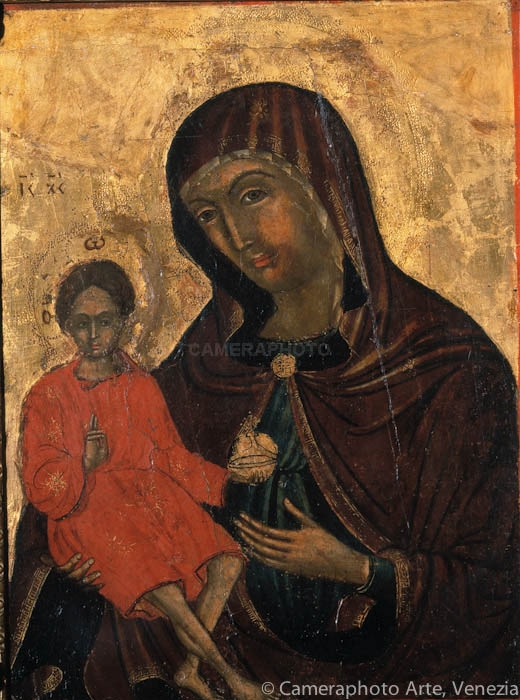I put aside the day’s news with one thought: the end times are always with us. We do not have to wait for their approach—not tomorrow, not next year, not some distant century. They abide with us. We are forever in them. And every morning we awaken one day closer to the solitary Apocalypse that waits for each of us.
It is easy to forget that the peace we are promised is eschatological, not historical. We have no guarantee of salvation in or through history. To pretend otherwise is to soothe our disquiet with magical thinking. News broadcasts are a potent corrective. They turn our eyes toward a blood red moon that rises nightly in defiance of our beseechings and our hopes. It can climb the skies elsewhere—away from you and me—for only so long.

All our prayers for peace in the here and now are futile if we lack faith in the decency of our own side, or surrender the will to assert our own cause. No Virgin of the Rosary, no icon held aloft, will fortify a people too timorous, complacent or polite to act to preserve themselves. If we cannot bring ourselves to believe that our nation—our civilization—deserves a commanding place in this fractured world, we have no business imploring heaven to grant us peace. It will not descend like the dew fall. It has to be won.

At Mass, the boilerplate wording of petitionary prayers lulls us into thinking that if we lift our hands high enough—recite another rosary, another chaplet of mercy—the vaporous invocations of the USCCB will be realized:
For leaders around world, that they might find ways to bring an end to war and violence, and promote peace and development for all nations, we pray to the Lord. . . .
The passivity implicit in those words is indecent. Those airy, unspecified ways are not waiting to be sniffed out like truffles under a hazelwood tree. The feeble high-mindedness of the USCCB’s online sampler of suggested intercessions is a case study in sanctimonious detachment from serious engagement with critical issues on any level but the rhetorical.
• • • •
Looking at the map of wars and violence across the world, we see Islam staining the bulk of it. It is in ascendance after a century of quiescence. Islam Rising is a consequence of our own hesitancies, those self-flagellating guilts and delusions that permit it.
Hilaire Belloc was prescient. In 1938, not long after the formal dissolution of the Ottoman Empire, he predicted the return of Islam. He grasped what others continue to miss: that Islam, with its militant vitality, had never gone away:
It has always seemed to me possible, and even probable, that there would be a resurrection of Islam and that our sons and our grandsons would see the renewal of that tremendous struggle between the Christian culture and what has been for more than a thousand years its greatest opponent.
• • • •
Here on my desk is a prayer from Archbishop Timothy Broglio, Archdiocese of the Military Services, USA. It begins:
Almighty God and Father, look with love upon our men and women in uniform and protect them in their time of need. Give them health and stability and allow them to return to their loved ones whole and unshaken. Be with their families and sustain them in these uncertain times.
The prayer is somehow off key, peaceable and tender to a fault. In their time of need. We could say the same thing about anyone at any time, and in the grip of any of life’s difficulties or sorrows. Health and stability. How does that translate on the battlefield? It is a nebulous pairing that veils the agonies, terrors, and deformations of war. Unshaken. In regard to what?
There is not a word here about victory, about defeating an enemy, or gaining dominion over the forces that threaten soldiers’ lives and ours. The prayer displays no gratitude for the heroic generosity and idealism that prompts young men and women to gamble their lives and the future of their families on the missions assigned to them.
What does it mean to be sustained in uncertain times? Uncertainty bedevils all times. There can be no sustenance without confidence that there exists something worth sustaining, worth the dreaded risk of death or disfigurement. Worth confronting the unspeakable. That fragile and perishable something is not hard to name: our Constitutional freedoms, the concept of human rights, the rule of law. The tragedy of our volunteer military is that their own leaders—and pastors—exhibit uncertainty themselves. They exhibit a kind of morose embarrassment at the reality that Western democracies have to be vigorously and effectively armed against the forces of tyranny.
• • • •
One visiting priest to my local parish still waves the same anti-war banner he carried in the Sixties. His pastoral prayer always includes a plea that there be “no boots on the ground” in Iraq or Afghanistan. Since the petition is offered as a corporate prayer, the early morning congregation is captive to the man’s personal faith in tattered phantoms of dialogue and non-violence against Christianity’s ancient destroyer.

• • • •
Belloc emphasized that Islam remained “intensely alive” on a moral plane even while it was paralyzed politically. He understood the dormancy of Islam as a temporary phenomenon: “We are in the presence of an unstable equilibrium which cannot remain permanently unstable.”
Mary Beard’s history of ancient Rome, SPQR, contains a photograph of a remnant of the First Punic War being raised from the bottom of the sea. It is one of the rams used by ancient war ships against enemy vessels. Many were inscribed in much the same way World War II fighter pilots decorated the nose of their planes. Beard cites the inscription on a surviving Carthaginian ram: “We pray to Baal that this ram will go into this enemy ship and make a big hole.”
That, friends, is a prayer for peace.




